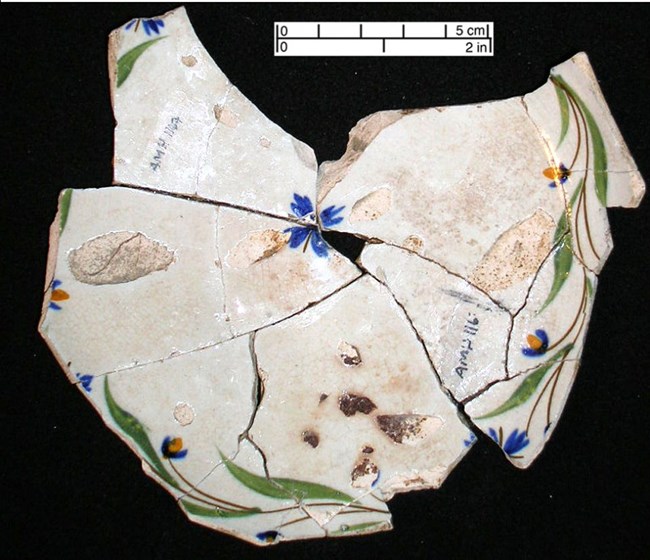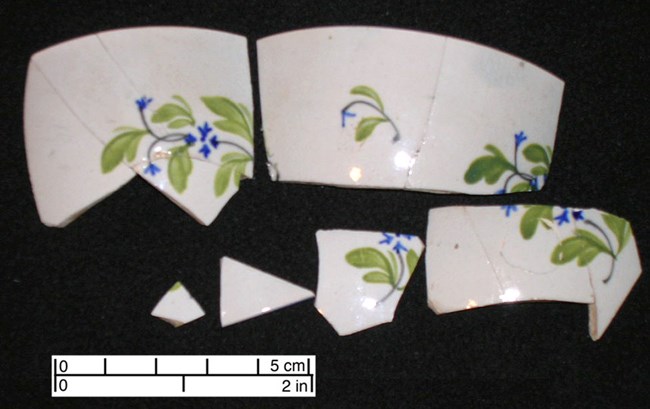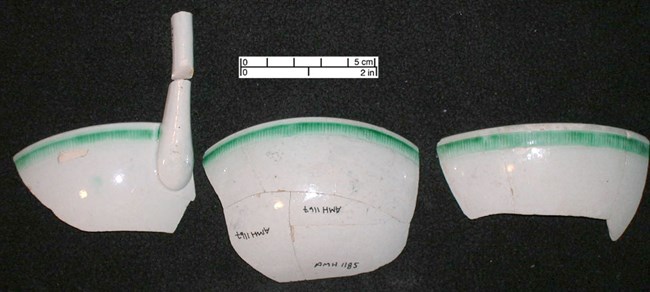Last updated: October 3, 2022
Article
Domingo Williams
While known as a place of worship, education, and activism, the African Meeting House also served as a home. Domingo Williams and his family resided in the basement apartment of the African Meeting House from around 1819 to 1830.[1] Newspaper articles, including a few obituaries, shed light on Williams’ influence on the Smith Court community. Described as “wise and amiable,” Williams played an integral role in his community through his profession as a caterer and his participation in various community events.[2]
The Attendant General
For over 20 years, Domingo Williams served as the “Attendant General to fashionable parties, assemblies and social entertainments, both public and private.”[3] Williams defined a career path for himself as an honorable attendant (waiter) and caterer.[4] Hosts called upon Williams to consult on and help them make arrangements for their events. His obituary in The Liberator highlighted his trusted advice for all aspects of planning a party, including:
what sort of preparation was necessary for the kind of party intended, — what arrangements were appropriate, — what kinds of provision and delicacies were adapted to the season and the particular occasion, — and what quantity of each was requisite for any given number of guests.[5]
This obituary praised Williams for his remarkable organization and attention to details. From preparing for a party by sending out invitations and determining the necessary amount of supplies, to managing the party itself by directing fellow attendants and ensuring nothing ran out, Williams took great care with his craft.[6] As his obituary noted,

University of Massachusetts Boston, Figure 5.04
Indeed so judicious were all his arrangements, that his employers not only had the gratifications of seeing every thing managed to their minds, but had no reason to be dissatisfied with the expenses incurred.[7]
Domingo Williams’ profession led archaeologists to believe that his tenancy at the African Meeting House could be responsible for the numerous ceramics found in archaeological excavations there. After the 2005 excavation outside the African Meeting House, archaeologists from the Andrew Fiske Memorial Center for Archaeological Research at University of Massachusetts Boston suggested that the found ceramics may have “[reflected] the work of Mr. Williams as a caterer, perhaps helping arrange functions at the Meeting house as well as outside affairs.”[8]

University of Massachusetts Boston, Figure 5.05

University of Massachusetts Boston, Figure 5.06
While previous investigations from the 1975-1985 excavations concluded the ceramics reflected the public dinners held at the African Meeting House, the Fiske Memorial Center’s Study suggested some of these ceramics could also be the trash of Domingo Williams, who had a highly regarded catering business.[9] Many of these ceramics date back before 1840, which supports this theory since Williams lived in the apartment from 1819 to 1830.[10] As the report stated,
The dates of the vessels, the dominance of high-quality wares, as well as the sheer numbers of vessels support this hypothesis. As the assemblage of a caterer, the ceramics reflect the tableware styles and decorative types deemed appropriate by the larger discerning public.[11]

University of Massachusetts Boston, Figure 5.09
Although these ceramics cannot be directly attributed to Domingo Williams, the sheer amount of ceramics found in these excavations combined with his profession suggest some may have belonged to him in addition to being from the public dinners held at the Meeting House.[12]
Community Member
While obituaries detail Domingo Williams’ career as an attendant and caterer, other newspapers highlighted a few community events in which he participated.
When the King of France officially recognized Haiti’s independence, Domingo Williams helped lead the celebrations in Boston, serving as President for the day’s festivities.[13] On August 23, 1825, Williams and other Black community members recognized Haitian freedom with a procession to the “African School-House, which was beautifully decorated for the occasion.”[14] Inside, organizers toasted the Haitians, with Domingo Williams toasting President Boyer of Haiti:
May the wisdom of his Counsels, the skill and equity of his government, and the sublime virtues of his private life, secure to him the splendid popularity of Washington, and transmit his name with equal lustre to the most distant ages as the Father of his Country.[15]

The Columbian Centinel
More notably, Domingo Williams served as the Chairman of the Committee of Arrangements for a public dinner held in honor of Prince Abduhl Rahhahman, who travelled to Boston in August 1828. Enslaved for 40 years in Mississippi, this African Prince gained his freedom after President John Quincy Adams and Secretary of State Henry Clay requested that his enslaver free him.[16] Before his departure to the African continent, Black Bostonians welcomed Prince Abduhl Rahhahman and celebrated his freedom. At the August dinner, Domingo Williams gave a toast that caused an uproar in the South. Williams toasted:
May the Slave-Holders of the world be like the whales in the ocean, with the trasher at their back, and the sword fish at their belly, until they rightly understand the difference between freedom and slavery.[17]
Newspapers in Natchez, Mississippi and New Orleans, Louisiana reported on the public dinner and decried the toast as an “awful and bloody threat” because it “[asks] that ‘the slave holders’ should be put to the sword.”[18] They additionally expressed fear as to what would happen if “our blacks are inoculated with the doctrines contained in the toasts.”[19]
In 1862, The Liberator recalled this toast and southern newspapers’ reaction, suggesting that David Walker’s radical antislavery pamphlet The Appeal to the Colored Citizens of the World influenced Williams’ words at this public dinner.[20] The Liberator also proclaimed:
Had Mr. Williams lived till this day, he would have beheld its fulfilment; for between the armies of the North, and the black soldiers of the South, the monster must soon sink beneath the fiery waves of a world’s indignation.[21]
Legacy
About a year after Domingo Williams moved out of the basement apartment of the African Meeting House, he died at age 67. Many people in Boston’s African American community mourned his loss and celebrated his life. The Black waiters “[lamented] the extreme loss of their General.”[22] His obituary in The Liberator stated, “it will be difficult to find a factotum to fill his place” and “his death will be lamented by all who knew him.”[23]
An obituary from the Columbian Centinel credited Williams with influencing those around him through his good character:
Much of the good order and peace of our community – much of that decent, regular and becoming conduct which distinguishes a large part of our coloured population, and makes so many of them useful and valuable citizens, was owing to the integrity and good feeling of Domingo Williams.[24]
Those reminiscing his life highlighted his dedication to his profession and his regard for decorum. His character seemed to be one worth imitating, as this obituary concluded:
The death of Williams is a loss to the public – and though he was not distinguished by those decorations which form the common trophies of ambition, or rank, or wealth, or power, he had what was most valuable to himself and the community – a good heart – honest purpose – and habits of industry that are worthy of remembrance and imitations.[25]
Footnotes
[1] “Investigating the Heart of a Community: Archaeological Excavation at the African Meeting House, Boston, Massachusetts,” ed. David B. Landon, Ph.D., Andrew Fiske Memorial Center for Archaeological Research Cultural Resource Management Study No. 22 (University of Massachusetts Boston, 2007), 86.
[2] “Obituary,” The Liberator, Jan. 21, 1832.
[3] “Obituary.”
[4] “Obituary.”
[5] “Obituary.”
[6] “Obituary.”
[7] “Obituary.”
[8] “Investigating the Heart of a Community,“ 17.
[9] “Investigating the Heart of a Community,“ 79, 175.
[10] “Investigating the Heart of a Community,“ 86.
[11] “Investigating the Heart of a Community,“ 175.
[12] “Investigating the Heart of a Community,“ 175
[13] “Celebration of Independence,” Columbian Centinel, Aug. 20, 1825.
[14] “Celebration of Haytien Independence. Communicated,” Columbian Centinel, Aug. 31, 1825.
[15] “Celebration of Haytien Independence. Communicated.”
[16] “Mr. Adams and the Emancipation of Slaves and the violation of the faith of the Administration,” Statesman and Gazette (Natchez, MS), Oct. 16, 1828.; "From African Prince to Mississippi Slave: Abdul Rahman Ibrahima," Documenting the American South, University of North Carolina, Chapel Hill, June 2020, https://docsouth.unc.edu/highlights/ibrahima.html.
[17] “From the Boston Centinel. Ebony Dinner.,” Salem Gazette, Aug. 26, 1828.
[18] “Mr. Adams and the Emancipation of Slaves and the violation of the faith of the Administration,” Statesman and Gazette (Natchez, MS), Oct. 16, 1828.; “Mr. Adams and the Emancipation of Slaves and the violation of the faith of the Administration,” Louisiana Weekly Advertiser (New Orleans, LA), Oct. 25, 1828.
[19] “Mr. Adams and the Emancipation of Slaves and the violation of the faith of the Administration,”(Natchez, MS).
[20] “Matters and Things,” The Liberator, Dec. 5, 1862.
[21] “Matters and Things.”
[22] Boston Daily Advertiser, Jan. 21, 1832.
[23] “Obituary.”
[24] "Obituary," Columbian Centinel (Boston, MA), Jan. 14, 1832.
[25] "Obituary," Columbian Centinel
